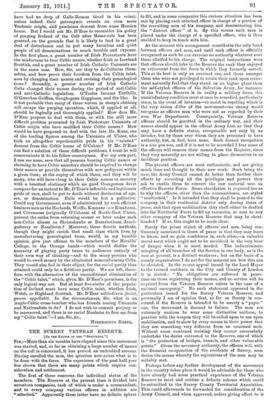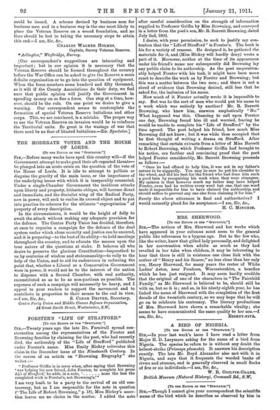THE SURREY VETERAN RESERVE.
1.1.0 THE EDITOR Or THE " SPECTATOR:1 SIB,, More than six months have elapsed since this movement was started, and, so far as obtaining a large number of names on the roll is concerned, it has proved an undoubted success. Having enrolled the men, the question now arises what is to be done with the force. The experience of the past half-year has shown that there are many points which require con- sideration and settlement.
The first of these concerns the individual status of the members. The Reserve at the present time is divided into seventeen companies, each of which is under a. commandant, and to every company various officers in addition are "attached." Apparently these latter have no definite sphere
to fill, and in some companies this curious situation has been met by placing each attached officer in charge of a portion of the recruiting area of his company, and denominating him the " district officer " of it. By this means each man is placed under the charge of a specified officer, who is thus enabled to keep in touch with him.
At the moment this arrangement constitutes the only bond between officers and men, and until each officer is officially recognised as such he can exercise no authority whatever over those allotted to his charge. The original instructions were that officers should take in the Reserve the rank they enjoyed on retirement from the force in which they formerly served. This at its best is only an assumed one, and those amongst them who were not privileged to retain their rank upon retire- ment naturally feel that they stand on no higher plane than the self-styled officers of the Salvation Army, for instance. If the Veteran Reserve is in reality a military force, this unsatisfactory condition must at once be remedied, particularly since, in the event of invasion—to assist in repelling which is the very raison d'etre of the movement—no enemy would recognise as officers men who were not so regarded by their own War Department. Consequently, Veteran Reserve officers should be gazetted in the ordinary way, and their names should appear in the official Army List, so that they may have a definite status, recognisable not only by an invader, but by those over whom they are presumed to have authority, but, in fact, have none. Such formal recognition is a sine qua non, and if it is not to be accorded I fear some of the officers will remove their names from the Register, since they very naturally are not willing to place themselves in an invidious position.
The present officers are most enthusiastic, and are giving much time and thought to their new work. Such being the case, the Army Council cannot do better than further their efforts by according all the privileges and powers they ask to enable them to convert the raw material into an effective Reserve Force. Some elucidation is required too as to why the officers, other than the commandants, are styled "unattached." Is it intended that they shall be posted to the company in their residential district only during times of peace, and that upon mobilisation they shall either be drafted into the Territorial Force to fill up vacancies, or sent to any other company of the Veteran Reserve that may be short- handed ? If so, this ought to be made clear.
Surely the prime object of officers and men being con- tinuously associated in times of peace is that they may learn to know, and so gain confidence in, each other,—a valuable moral asset which ought not to be sacrificed in the very hour of danger when it is most needed. The indiscriminate mingling of all branches of the Service in one body, as is the case at present, is a distinct weakness ; but on the basis of a county organisation I do not for the moment see how this can be obviated. In the recent appeal issued by the Lord Mayor to the trained residents in the City and County of London it is stated : " No obligations are enforced in peace- time on those registering their names, and no service will be required from the Veteran Reserve unless in the case of a national emergency." No such statement appeared in the particulars issued for the Surrey Veteran Reserve, and personally I am of opinion that, so far as Surrey is con- cerned, if the Reserve is intended to be merely a. " paper " one, the movement is doomed to failure. The men are extremely anxious to wear some distinctive uniform, to practise with the weapon they will be called upon to use upon mobilisation, and to show by every means in their power that they are something very different from an unarmed mob. Without some combined training they cannot successfully undertake the duties entrusted to the Reserve, one of which is " the protection of bridges, tunnels, and other vulnerable points." Given the necessary authority, the officers will, with the financial co-operation of the residents of Surrey, soon devise the means whereby the aspirations of the men may be suitably met.
Perhaps before any further development of the movement in the country takes place it would be advisable for those who have already had some practical experience of the Veteran Reserve to meet and outline a definite scheme which could be submitted to the Surrey County Territorial Association.
This could afterwards be forwarded for consideration of the Army Council, and when approved, orders giving effect to it could be issued. A scheme devised by business men for business men and in a business way is the one most likely to place the Veteran Reserve on a sound foundation, and no time should be lost in taking the necessary steps to attain this end.—I am, Sir, &c.,
CHARLES WALKER HOLMES,
Captain, Surrey Veteran Reserve. "Arlington," Weybridge, Surrey.
[Our correspondent's suggestions are interesting and important ; but in our opinion it is necessary that the Veteran Reserve should be formed throughout the country before the War Office can be asked to give the Reserve a more definite organisation or to go into the question of equipment. When the force numbers some hundred and fifty thousand, as it will if the County Associations do their duty, we feel sure that public opinion will justify the Government in spending money on so fine a force. One step at a time, how- ever, should be the rule. On one point we desire to give a warning. Our correspondent seems to contemplate the formation of special Veteran Reserve battalions and other corps. This, we are convinced, is a mistake. The proper way to use the Veteran Reserve on invasion would be to reinforce the Territorial units. So great is the wastage of war that there need be no fear of bloated battalions.—ED. Spectator.]











































 Previous page
Previous page